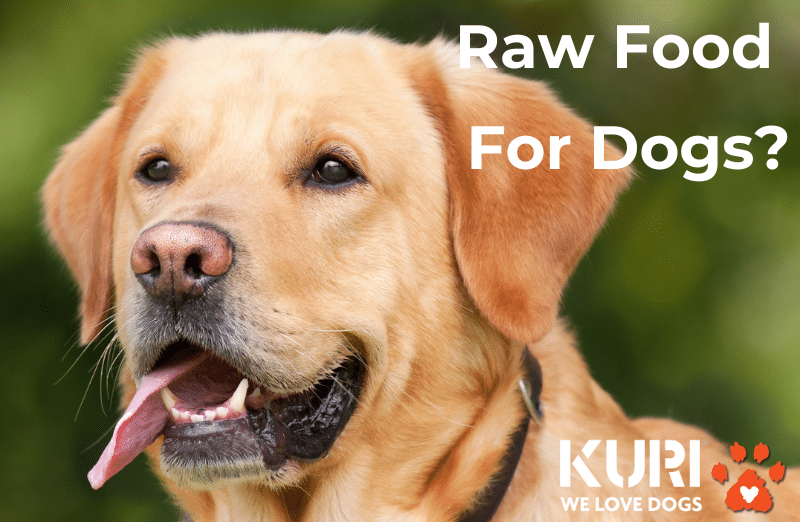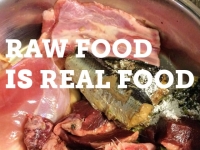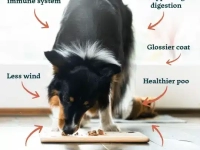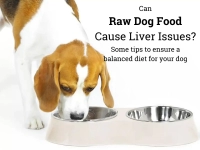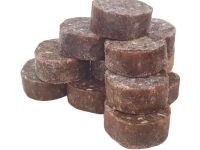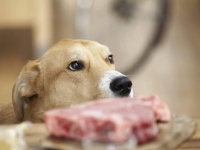The Raw Deal: Is a Raw Dog Food Diet the Ultimate Dogs Dinner?
In This Article...
THE OVERVIEW...
The debate surrounding canine nutrition has taken a bold turn with the rise of raw dog food diets for dogs. As dog owners increasingly seek natural feeding options, one question lingers: is the raw food diet really a good choice for our dogs?.
What is a Raw Dog Food Diet for Dogs?
A raw food diet for dogs, often referred to as a BARF (Biologically Appropriate Raw Food) diet, typically consists of a combination of raw meat, bones, fruits, vegetables, and sometimes supplements. Advocates believe that this diet closely mirrors what canines would consume in the wild, promoting a more natural and balanced nutrition profile.
The Appeal of Raw Dog Food Diets
Many pet owners gravitate towards raw diets, drawn by the promise of improved health outcomes. In fact, when we switched our dogs to raw dog food we noticed improvements in coat condition, increased energy levels, and even better dental health (due to the bones). The philosophy behind raw feeding aligns with a desire for a more holistic, natural approach to pet care, drawing on the concept that dogs thrive on unprocessed foods.
Is a Raw Dog Food Diet Better for Dogs?
Pros of Raw Dog Food
- Improved Coat Condition: Many owners note shinier, healthier coats.
- Better Dental Health: Chewing raw bones can help reduce plaque and tartar buildup.
- Increased Energy Levels: A diet rich in natural nutrients may lead to a more energetic pet.
- Weight Management: Raw diets can be tailored to meet specific caloric needs, aiding in weight control.
Scientific Evidence
While anecdotal evidence is abundant, scientific studies supporting the benefits of raw diets remain limited. This is in part because nutritional research funding is controlled by the companies that produce kibble – Nestle, Mars, Colgate. Small pockets of research is ongoing, and finding positive health outcomes for dogs in comparison studies between kibble and raw dog food. As with anything, we do recommend you do your own research and as mentioned earlier, be mindful of where the research comes from.
The Disadvantages of Raw Dog Food
Bacterial Contamination Risks
Nutritional Imbalances
A raw food diet can lead to nutritional deficiencies or excesses if not properly balanced. Dogs require a specific array of nutrients, and finding the right balance can prove challenging without expert guidance. At Kuri City we take pride in designing recipes that balance muscle, fat and organ meat to promote a balanced raw dog food
Physical Risks
Feeding bones can be hazardous, with risks of choking or internal injuries. Careful selection and preparation of these items are paramount to avoid dangerous situations. It is important to always supervise your dog with raw bones, and start with the appropriate sizes.
Do Vets Recommend Raw Dog Food?
Veterinary opinions on raw dog food diets vary. Many vets express caution, highlighting the risks associated with raw feeding. A study revealed that a significant portion of veterinarians do not endorse raw diets, citing health concerns. Some may consider a raw dog food diet for dogs with specific health issues, provided it’s well-balanced and closely monitored.
Comparing Raw Food Diets and Traditional Dog Food
Nutritional Comparisons
Kibble is designed to be nutritionally accurate and palatable. Every bag is the same. Day after day. Great for convenience, not for variety. Raw food takes a longer term approach to nutrition. It relies on you to be proactive, visiting the vet annual for check ups, monitoring weight and exercise and making small changes to how much and what is fed as needed.
Cost Analysis
Feeding a raw dog food diet is similar to high quality kibbles when comparing prices. Remember that you get what you pay for with dog food. Lower cost, lower quality. Kuri Raw Dog Food is a premium product at a reasonable price to ensure that we can share the benefits of raw feeding. What you might not consider is the long-term improvements to the health of your dog due to improved nutrition and the implications of this on the cost of vet fees.
Convenience and Preparation
Frozen raw diets require no more time and effort to prepare safely than kibble. Feed defrosted or still frozen (on a hot day). At Kuri we’ve managed the convenience for busy pet owners, allowing you to spend more time with your dog.
Making the Switch: What to Consider
Consultation with a Veterinarian
Before making any dietary changes, consulting with a holistic veterinarian is wise. Professional guidance ensures a balanced approach tailored to your dog’s unique needs.
Transitioning Slowly
Shifting from processed food to raw should occur gradually. A sudden change can lead to digestive upset. Mixing the two diets initially can ease this transition. Check out or transition guide for more information.
Monitoring Health
Regular veterinary check-ups are essential for tracking your dog’s health and adjusting their diet as needed.
Conclusion
The raw food diet presents a tantalising option for dog owners seeking alternatives to traditional feeding practices. While the allure of natural nutrition is compelling, the associated risks cannot be ignored. An informed decision, supported by veterinary advice, will always serve the best interests of your canine companion.
FAQ About Raw Dog Food Diets
Is a raw food diet better for dogs?
The debate continues. While some owners report benefits, scientific evidence supporting raw diets is increasing and reporting favourable outcomes. The risks of traditional dog foods are also being reported.
What are the disadvantages of a raw dog food diet?
Main disadvantages include risks of bacterial contamination, potential nutritional imbalances, and physical hazards from bones. At Kuri we believe that all of these risks are minimal with our product and your care at home.
Do vets recommend raw dog food?
Most veterinarians do not have a background in animal nutrition and so advise caution regarding raw diets, though some with appropriate training and experience suggest raw diets under specific circumstances with monitoring.
Considering a Raw Dog Food Diet?
Have you considered a raw dog food diet for your dog? Share your experiences or questions in the comments below. For more insights into pet health, subscribe to our newsletter!
For those looking to explore raw food options further, check out the Food Selector for guidance.


